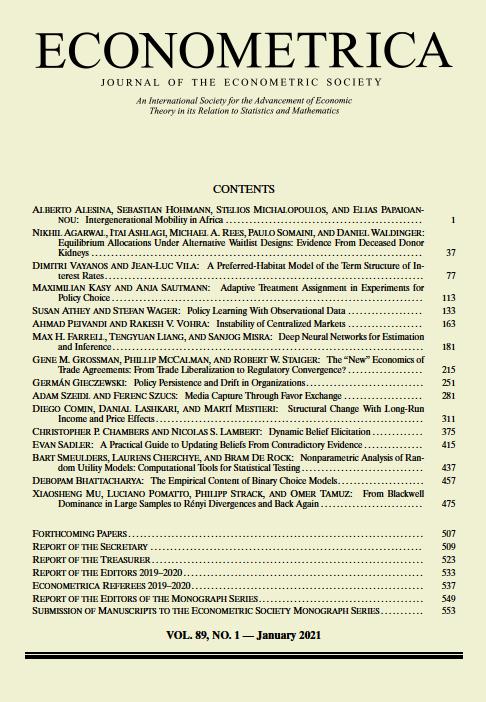在网络的重复互动中学习
IF 6.6
1区 经济学
Q1 ECONOMICS
引用次数: 0
摘要
我们研究的是长期存在的理性代理人如何在社会网络中学习。在每个时期,每个代理人在观察了其邻居过去的行动后,都会收到一个私人信号,并选择一个其收益只取决于状态的行动。由于均衡行动取决于高阶信念,因此很难描述行为特征。不过,我们的研究表明,无论网络的规模和形状、效用函数以及代理人的耐心如何,任何均衡状态下的学习速度都会受到一个常数的约束,而这个常数只取决于私人信号的分布。本文章由计算机程序翻译,如有差异,请以英文原文为准。
Learning in Repeated Interactions on Networks
We study how long-lived, rational agents learn in a social network. In every period, after observing the past actions of his neighbors, each agent receives a private signal, and chooses an action whose payoff depends only on the state. Since equilibrium actions depend on higher-order beliefs, it is difficult to characterize behavior. Nevertheless, we show that regardless of the size and shape of the network, the utility function, and the patience of the agents, the speed of learning in any equilibrium is bounded from above by a constant that only depends on the private signal distribution.
求助全文
通过发布文献求助,成功后即可免费获取论文全文。
去求助
来源期刊

Econometrica
社会科学-数学跨学科应用
CiteScore
11.00
自引率
3.30%
发文量
75
审稿时长
6-12 weeks
期刊介绍:
Econometrica publishes original articles in all branches of economics - theoretical and empirical, abstract and applied, providing wide-ranging coverage across the subject area. It promotes studies that aim at the unification of the theoretical-quantitative and the empirical-quantitative approach to economic problems and that are penetrated by constructive and rigorous thinking. It explores a unique range of topics each year - from the frontier of theoretical developments in many new and important areas, to research on current and applied economic problems, to methodologically innovative, theoretical and applied studies in econometrics.
Econometrica maintains a long tradition that submitted articles are refereed carefully and that detailed and thoughtful referee reports are provided to the author as an aid to scientific research, thus ensuring the high calibre of papers found in Econometrica. An international board of editors, together with the referees it has selected, has succeeded in substantially reducing editorial turnaround time, thereby encouraging submissions of the highest quality.
We strongly encourage recent Ph. D. graduates to submit their work to Econometrica. Our policy is to take into account the fact that recent graduates are less experienced in the process of writing and submitting papers.
 求助内容:
求助内容: 应助结果提醒方式:
应助结果提醒方式:


